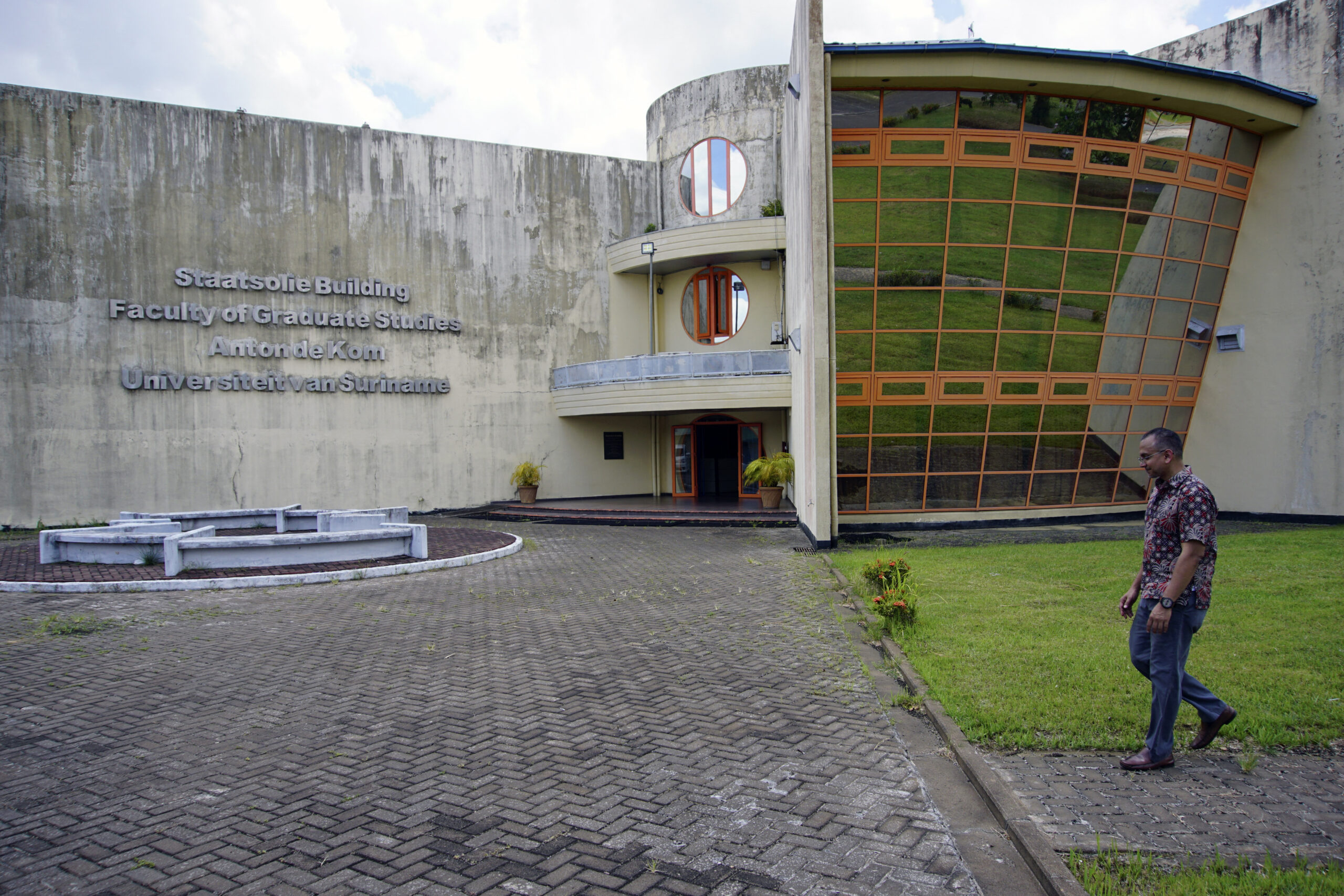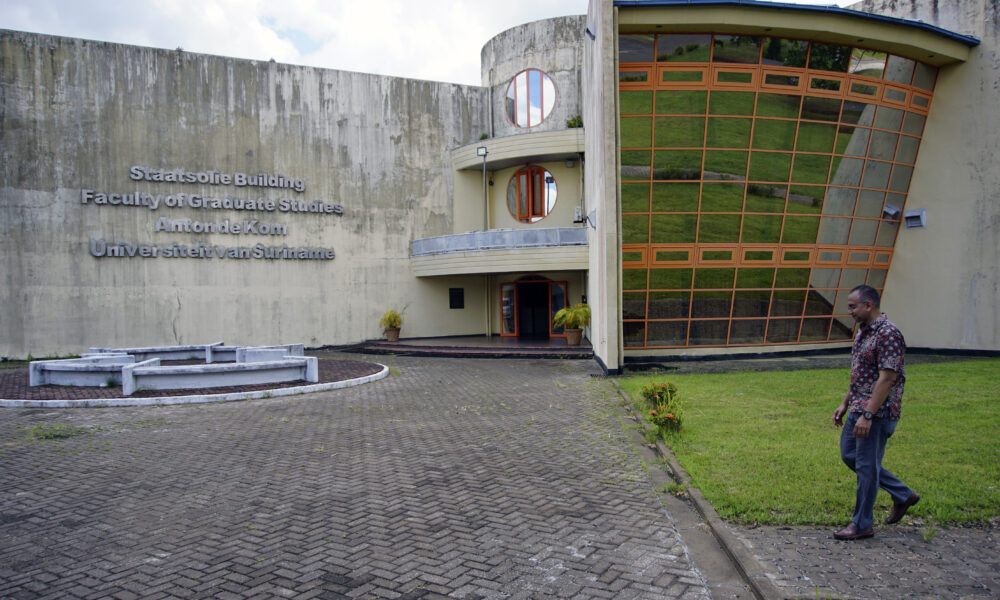International
‘Black gold’ for Guyana and Suriname, a blessing or curse?

AFP | Patrick Fort
Emerging as potential oil powers while the world seeks to wean itself off planet-warming fossil fuels, poverty-stricken South American neighbors Guyana and Suriname say they have to cash in while they can.
The former Dutch colonies are among the world’s most tree-covered countries, hosts to the so-called forest “lungs” that sequester massive amounts of planet-warming carbon dioxide.
Their economies and populations small, the countries have traditionally emitted little CO2 or other greenhouse gasses from fossil fuel use — in fact Suriname is one of only three carbon-negative countries in the world and Guyana claims carbon neutrality.
But some fear this could change with the recent discovery of rich offshore oil deposits in an area known as the Guyana-Suriname Basin.
Guyana, a country of 800,000 people, was recently found to have proven reserves of at least 10 billion barrels of oil, likely much more according to experts.
This makes it the country with the highest reserves per capita in the world — which consumes 99.4 million barrels of oil per day.
Early assessments suggest the reserves of Suriname, a country of 600,000 people, may not be far behind.
“It will be hard to remain carbon neutral as a country (involved in the) petroleum sector,” economist Steven Debipersad of the Anton de Kom University in Suriname’s capital Paramaribo, told AFP.
The projected $10 billion Suriname stands to make in the next 10 to 20 years, will likely bring economic growth at the cost of the environment, he said.
The country’s GDP today is about $3 billion.
Hungry ‘every day’
Their presidents insist Guyana and Suriname cannot be expected to turn their backs on a chance to fill their countries’ coffers and raise the quality of life for their people.
The countries are among the poorest in South America, with vast swathes of their populations living without electricity, clean water or access to adequate health services.
In a Paramaribo ghetto named Texas, dirty sewer water flows among dilapidated wooden homes.
Resident Edison Poekitie, a 23-year-old musician, scrapes by on no more than $50 a week. Does he go hungry?
“Every day!” he told AFP. “It’s hard out here, really hard.”
The community, he added, needs “water pipes, cables, new roads without potholes, schools, better houses, playgrounds…”
Poekitie said he hoped the government would spend the oil money “wisely,” a sentiment echoed by 45-year-old food truck owner Brian Braithwaite in a poor neighborhood of the Guyanese capital Georgetown.
“Hopefully they do something so that… people (who) live on the street can do better,” Braithwaite said.
‘Oil curse’
Both presidents have vowed to make judicious use of their windfall petroleum profits, though some are worried that will undercut the sovereign wealth funds set up to guard some money for future generations.
“We are quite aware of the oil curse,” Suriname President Chan Santokhi told AFP, alluding to neighbor Venezuela and other resource-rich countries such as Angola and Algeria that were unable to turn oil wealth into social and economic progress.
“We… should also get the opportunity to benefit from the production of oil and gas and its income” to address a biting economic crisis “and help our people to have better lives,” he insisted.
For his part, Guyanese President Mohamed Irfaan Ali wants to use the oil income to “create wealth for now, and future generations.”
Both speak of using the money to diversify their economies with investments in agriculture, tourism, housing, education and health care.
Eventually, “the oil and gas will be gone, but the food security should be guaranteed,” said Santokhi.
Oil money for green energy
Oil extraction and refining are major contributors to greenhouse gas emissions.
Though they have historically emitted little, Suriname and Guyana are both deeply affected by global warming — in the crosshairs of worsening tropical storms and of flooding from rising sea levels.
Presidents Santokhi and Irfaan Ali believe they can maintain their countries’ carbon balances by using oil money to protect their forests and invest in green energy.
Defending the forests that cover about 87 percent of Guyana and 93 percent of Suriname is also economically sage: both countries can sell so-called carbon credits to polluters who need to offset emissions.
For Guyana, carbon credits are worth about $190 million per year, said Irfaan Ali.
Monique Pool, director of the Green Heritage Fund of Suriname, is not convinced by the two-pronged approach.
“Carbon credit will give us more money faster than oil and gas and for longer because it will be sustainable,” she told AFP.
In Georgetown, activist Christopher Ram agreed the oil should be left in the ground, expressing fear of exploitation by ruthless companies in the absence of “good governance.”
Instead, “I would go to the international community and say: ‘We are a small country, we’ve always been good to the environment, we want to stay that way… help us get the benefits we would have got with oil’.”
But 53-year-old Cynthia Neel, who sent her daughter from Suriname to the Netherlands at the age of six for education and a chance at a better life, is hopeful of positive change.
“I hope that with the oil the children will no longer have to leave,” she told AFP.
International
Claudia Sheinbaum: Operation Against ‘El Mencho’ Was Based on Pending Arrest Warrants

Mexico’s President Claudia Sheinbaum on Wednesday rejected claims that the military operation that resulted in the death of Nemesio Oseguera Cervantes, known as “El Mencho,” leader of the Jalisco New Generation Cartel (CJNG), was carried out under pressure from the United States government.
Sheinbaum explained that the deployment of federal forces was aimed at executing outstanding arrest warrants against Oseguera Cervantes, who was considered one of the most wanted criminals in both Mexico and the United States.
“That was not the objective (to ease pressure from the United States). It is very important, and I want to repeat it. This individual had an arrest warrant, or several,” Sheinbaum said, referring to the operation conducted on February 22.
According to the president, the initial goal was to capture Oseguera Cervantes, but military forces responded after coming under attack during the intervention.
“The operation was to detain him. The problem is that they were attacked — the Secretariat of National Defense — and they responded at that moment,” she said.
The president insisted that the action was not carried out in response to external demands, although she acknowledged intelligence cooperation with the United States.
“It was not done in any way because of pressure from the United States, not at all. Of course, there was intelligence information from the United States that was used specifically,” she concluded.
International
Spain Denies Any Agreement to Cooperate with U.S. Military in Iran Operations
International
White House Says Spain Agrees to Cooperate with U.S. Military After Trump Threatens Trade Embargo

White House Press Secretary Karoline Leavitt said Wednesday that Spain has agreed “in recent hours” to cooperate with the U.S. military, following President Donald Trump’s threat to impose a trade embargo on Madrid.
Trump had warned of potential commercial measures after Spain reportedly refused to allow the Pentagon to use facilities at Spanish military bases for operations related to Iran.
“With respect to Spain, I think you heard the president’s message yesterday loud and clear, and I understand that in recent hours they have agreed to cooperate with the United States military,” Leavitt said during a press briefing.
She added that the U.S. military is currently coordinating with its counterparts in Spain. However, the president expects broader support.
“The president expects that all of Europe, all of our European allies, of course, will cooperate in this important mission — not only for the United States, but also for Europe,” Leavitt said.
Her remarks came in response to questions about Spain’s position and its role as a U.S. ally amid rising tensions surrounding operations involving Iran.
-

 International4 days ago
International4 days agoIran Reports 201 Dead, 747 Injured After U.S. and Israeli Strikes
-

 International3 days ago
International3 days agoBrazil’s Supreme Court Rejects Bolsonaro’s Bid for House Arrest
-

 International4 days ago
International4 days agoPope Leo XIV Urges End to ‘Spiral of Violence’ in Middle East
-

 International5 days ago
International5 days agoSecurity Council to Hold Emergency Meeting on Middle East Crisis
-

 International3 days ago
International3 days agoAnti-ICE Billboard Campaign Targets Immigration Spending in 31 U.S. Cities
-

 Sin categoría5 days ago
Sin categoría5 days agoTrump: ‘We Think It’s True’ Amid Claims Iran’s Supreme Leader Was Killed
-

 International2 days ago
International2 days agoSpain’s Prime Minister to Address Nation Amid Trump’s Trade Threats
-

 International3 days ago
International3 days agoTrump Warns of ‘Major Wave’ of Attacks as Iran Conflict Escalates
-

 International3 days ago
International3 days agoMexico Calls for Immediate Probe After National Dies in ICE Custody
-

 International16 hours ago
International16 hours agoWhite House Says Spain Agrees to Cooperate with U.S. Military After Trump Threatens Trade Embargo
-

 International3 days ago
International3 days agoBolivia Orders Three Investigations Into Deadly Military Plane Crash
-

 International16 hours ago
International16 hours agoSpain Denies Any Agreement to Cooperate with U.S. Military in Iran Operations
-

 International2 days ago
International2 days agoNew York Announces First 2,000 Seats in Universal 2-K Program
-

 Central America3 days ago
Central America3 days agoPanama Canal Monitoring Trade as Middle East Conflict Disrupts Shipping
-

 International2 days ago
International2 days agoWarner Bros. Developing First ‘Game of Thrones’ Movie With ‘Andor’ Writer
-

 Central America16 hours ago
Central America16 hours agoNicaragua Held Responsible for Harassment of Opposition Prosecutor and His Family
-

 Central America2 days ago
Central America2 days agoGuatemala’s Attorney General Fails in Bid for Top Court Seat Amid Corruption Allegations
-

 International16 hours ago
International16 hours agoClaudia Sheinbaum: Operation Against ‘El Mencho’ Was Based on Pending Arrest Warrants































